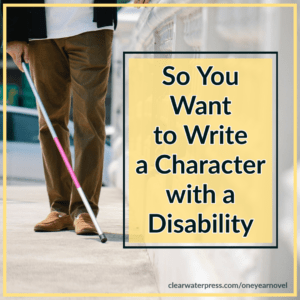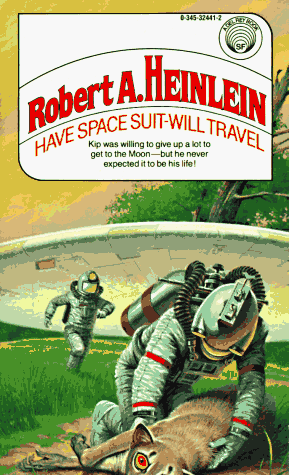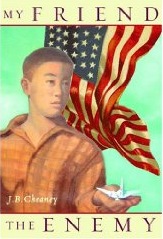So You Want to Write a Character with a Disability
By Rachel Petri, Student Contributor
 As a visually impaired student, I know that stories about disabled characters always resonate very deeply with me. I love to see another person face struggles that reflect mine and watch a character fight the same way I do. Many stories about disabilities have impacted me greatly, but there is a right and a wrong way to write about this topic. Every story says something bigger than the actual events and characters. They each have a message. Recognizing and evaluating this is vital to understanding how to write about any raw topic, not just disabilities. Two well-known novels illustrate this vividly.
As a visually impaired student, I know that stories about disabled characters always resonate very deeply with me. I love to see another person face struggles that reflect mine and watch a character fight the same way I do. Many stories about disabilities have impacted me greatly, but there is a right and a wrong way to write about this topic. Every story says something bigger than the actual events and characters. They each have a message. Recognizing and evaluating this is vital to understanding how to write about any raw topic, not just disabilities. Two well-known novels illustrate this vividly.
Without a doubt, one of the worst disability books I’ve read is Me Before You. I was excited when I first discovered it—it’s an interesting twist on the trope of “boy with this disability falls for girl with that disability” (which, by the way, is infuriating and boring most of the time—John Green pulled it off, but we can’t all be John Green). Louisa is hired on as a caretaker for Will, who became a quadriplegic after a terrible accident. Throughout the story we see that Will does not have the desire to keep living, and his parents hired Louisa hoping that she would be able to revitalize him. The plot centers on Lousia’s efforts to convince the bitter Will that he should keep living. It was a very real and raw book.
But the ending ruined the entire book for me and left a very discouraging taste in my mouth. Louisa does not convince Will. The theme that the author meant to convey, I believe, is that Will has taken control of his life and made his own choice. But that’s not what the story says. The most blatant message of the story is that life with a disability is not worth living. The author conveyed well how difficult it can be to live with a disability but did not characterize Will very much beyond this limitation and bitterness. A novel like this may be an accurate portrayal of some people’s stories, but the message it leaves is much bigger than one person’s perspective or experience. The purpose of a story—any story—should be to encourage and give hope, or to challenge thinking in some productive way. This book did exactly the opposite for me. It seemed to box millions of people into one choice and to distill life with a disability down to only its struggles. This is never the goal of good storytelling.
An extremely well-received book, Wonder, has a message of its own. (If you haven’t read this book, I demand that you close this blog post, find the nearest copy, and don’t return until you’ve finished it. I’ll wait.) One of the biggest reasons I love this story, and the reason it resonated with me so much as a kid, is that the author doesn’t shy away from the hard parts of being different. Since you’ve read it now, you don’t need a detailed summary, but the main character has severe craniofacial abnormalities. While this isn’t a disability, Auggie has had several surgeries and grown up facing many of the same struggles that disabled people do. We see little kids run away from Auggie’s face because it’s scary; we see Auggie’s best friend say very hurtful things to him; we see other students bully Auggie over his appearance.
But like any good story, it doesn’t stop there. I love that Wonder goes back and forth between the beautiful parts of his struggle and the messy parts—Auggie makes close friends (good), but hears one of them say something awful (bad). He is bullied by strangers (bad), but his classmates band together to defend him (good). It’s always “both, and,” instead of presuming that having friends will fix his hardship.
One of the major themes of the book is kindness. Auggie’s lunch table, originally mostly full of outcasts, becomes a home for a wide range of characters. Miles and Henry, originally some of the most outspoken students bullying Auggie, stand up for him in the most emotional scene of the novel. Auggie’s sister wrestles through living in what feels like his shadow and chooses to love him anyway. Strikingly different than the end of Me Before You, in the conclusion of Wonder, Auggie and his friends graduate fifth grade. The class is entirely different thanks to Auggie’s humor and kindness, and only a few people still think anything of his appearance. The story doesn’t suggest that having this support means that being different will suddenly be easy; instead, it encourages both Auggie and thousands of readers that your deeds matter more than your looks, that kindness is more valuable than being right, and that being different can be absolutely amazing. This is the goal of good storytelling.
I hope that the difference between these two stories is obvious to you. As a person with a disability, they both impacted me profoundly, but in very different ways. Stories are meant for more than entertainment. They should strive to be both real and hopeful, honest and encouraging. Both books handled the physical topic of disability well. Only one gave enough compassionate consideration to the message that would be left behind.
The events that happen to these characters, and to yours as you write, aren’t only happening to the characters. They’re happening to your readers, in a way that’s nonphysical but very true. And in another sense, they’re also happening to every real person who is like your character. These two novels showcase the importance of this very well.
I encourage you to think about this difference as you read other stories or craft your own. The difference is especially vivid in stories about disabilities, because the hardship is so raw and the hope is so vital. But it’s true of every single story, no matter the subject matter. Your story has a message that will be taken away and internalized by one, or a dozen, or a hundred readers. You can choose to leave them with hope and encouragement, or show the real struggle and stop there. Your story is saying something. Make sure it’s saying what you mean.
…
 Rachel Petri is an award-winning author focusing on disabilities. She is a senior in college, pursuing a career in counseling or child life to help kids with medical needs. Rachel loves to use her writing to both encourage people with disabilities and help other people understand her world. She joined OYAN in her senior year of high school in 2019 and has enjoyed the community of the OYAN forum. The Florida Christian Writers’ Conference and OYAN Winter Workshop in 2020 both helped shape her writing goals. She loves psychology, any form of chocolate, and can usually be found buried in a book. So far, she has published short stories and articles, but no books. Someday soon, Rachel hopes to publish a YA novel or personal stories about disabilities. Find her on Facebook at Rachel.Petri.Teenswithdisabilities.
Rachel Petri is an award-winning author focusing on disabilities. She is a senior in college, pursuing a career in counseling or child life to help kids with medical needs. Rachel loves to use her writing to both encourage people with disabilities and help other people understand her world. She joined OYAN in her senior year of high school in 2019 and has enjoyed the community of the OYAN forum. The Florida Christian Writers’ Conference and OYAN Winter Workshop in 2020 both helped shape her writing goals. She loves psychology, any form of chocolate, and can usually be found buried in a book. So far, she has published short stories and articles, but no books. Someday soon, Rachel hopes to publish a YA novel or personal stories about disabilities. Find her on Facebook at Rachel.Petri.Teenswithdisabilities.
* Please note that links on The One Year Adventure Novel Blog to other websites and blogs do not constitute an official endorsement. We are not intimately familiar with all the writing and opinions contained in outside links.


